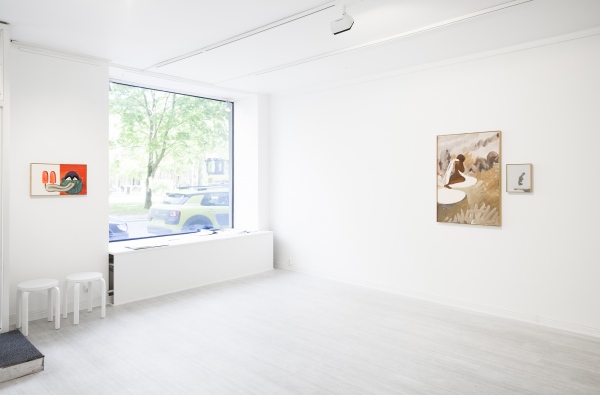-

.
.
.
Solo exhibition “Bērzkalni” at Galleria12, Helsinki, 2015.
The artist was showing works - paintings, ceramics and archival prints.
.
Bērzkalni, which translates as ‘birch hills’, is a location in the Alsunga district of Latvia, not far from the town of Kuldīga. There are no hills, in fact, and not a lot of birch-trees, either. It is a dense forest in front of Granddad’s house and the wetland area beyond it. It should have been the edge of the world where the wetlands came to an end; but then I grew up and, to my bitter disappointment, found out that there was actually an ordinary village beyond the wetlands.
My grandfather Vilis Melderis (1928–2006) was a passionate hunter, engineer, inventor and amateur photographer. He took pictures of his own family, nature, architecture and travels, as well as of himself. In the 1960s, he was treated for tuberculosis at a sanatorium in a Crimean resort.The sanatorium cleaner waltzes through her morning rounds with a feather duster in hand. The girl clearly senses when a suit-clad recovering invalid mentally caresses her bottom under the polyester pinafore again. Perhaps it is not a feather duster at all that the young Crimean woman is wielding but a brush for applying acrylics that will eventually return the original melancholic glow to the forgotten picture. Oh people of the planes, you that hail from the land of imaginary mountains! Is there anything more tedious than the boredom of the country life? It is all about whining and daydreaming. Huge potato bowls, sex in the shrubbery and wall-poster newspaper jokes.
The Crimean sanatorium is no longer a lung resort today; not a trace of the ‘consumption romance’ is left in its passages; no-one shivers at the thought of the ‘tiny moist nest of infection’ in someone’s lungs. No-one is lounging on the balcony, lost in a trance of oxygen overload, in a comfortable rest chair ideally suited to fit the curve of the spine and every movement of breathing, buttoned up in a bearskin-like sleeping bag – this treatment is no longer considered useful.
The ward on the first floor is now where rich people take sleeping classes. They learn how to fall asleep and take a nap. They have to sign up two years in advance to get treatment for sleeplessness. Do they ever dream?Meanwhile back in my Bērzkalni, the moon has been lighting her lantern high above the earth for thousands of years; cranes wake up whooping in the meadows; groves are alive with the buzzing of May bugs. A lamp with a shade is casting light in the sunroom; there is smoke coming from the chimney and a shadow is moving around in the fragrant twilight air. Life should be depicted neither the way it actually is, nor the way it ought to be: it should be shown the way we imagine it in our dreams.
The ideal observer is nothing but an instrument: a thermometer whose mercury has been shaken down by a firm hand to the very bottom of the glass tube – free, untouched by warmth, unengaged. But there is no such thing as an ideal observer; the transparent emptiness in the chest of a human being is filled by his or her presumptions and prejudices; he always has a body temperature of some description. I have never believed that man should attempt to get rid of each and every one of them: what would remain of him then? And yet the observer is always suspicious of himself; he knows that he is guilty because he is not indifferent.
There is no greater pleasure than sitting by the pond in Bērzkalni early in the evening. I am looking at the bobber: it is like a strawberry in the snow.
Photo: Pirje Mykkänen